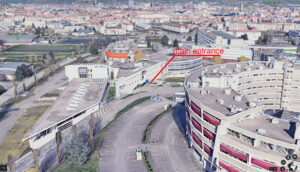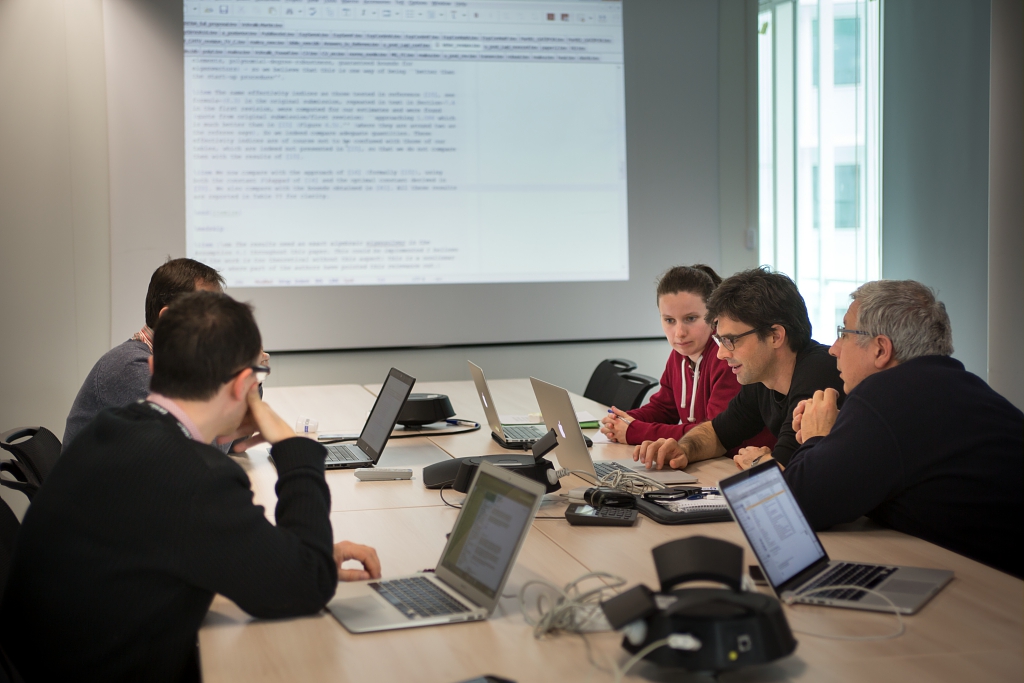2024 summer school on informatics
Hexahedral mesh for numerical simulation
Last update
- The summer school is located at the LORIA building. To go there, you can refer to the following map: https://www.loria.fr/en/loria/locate-us/.
- The main entrance is located in front of the parking (see picture below)

- If you plan to use bus transportation to come, please buy only one single ticket. We will provide you tickets for the week at your arrival at the school on Monday morning.
Social Events
- Tuesday June 11, 19h00-20h30. Nancy walking guided tour, meeting point in front of the “Office de tourisme”, place Stanislas.
- Wednesday June 12, 19h30. Dinner at “Grand Café Foy”, 1 place Stanislas.
Scientific context
In the numerical simulation process, mesh generation is a crucial and time-consuming step for the engineer. This is particularly true for hexahedral meshes, which are structured in blocks and can take expert engineers several days to generate, using interactive 3D tools that are complex to master. It’s a real challenge for expert engineers to work with interactive 3D tools that are complex to master.
Since hexahedral meshes are still preferred by various computational codes in fluid and solid mechanics, it is crucial to reduce the engineering time spent on generating them. This means developing new automatic or semi-automatic generation methods, setting up tools to diagnose the quality of a mesh according to the code that will use it, and specializing in interactive software to manipulate 3D hexahedral block structures. Faced with this challenge, many new methods have been developed in recent years to generate the desired meshes based on:
• The use of orientation fields;
• Global parameterization methods;
• Polycube construction;
• Manipulation of the dual structure of the mesh;
• Improvement of grid intersection methods;
• Manipulation of hexahedral structure strings and sheets.
In all cases, the problem is related to the global topological structuring of hexahedral meshes. In addition, several open-source software packages now offer functions enabling the scientific community to create their own meshes.
Contents
The aim of this summer school is to provide an overview of the automatic and semi-automatic methods currently used to generate hexahedral meshes for academic and industrial purposes. Starting from CAD-like geometric models as input data, recently developed practical and theoretical methods for generating and manipulating hexahedral meshes will be presented. In particular, the following points will be addressed:
• An overview of existing (semi-)automatic methods for generating hexahedral meshes with associated quality criteria;
• A focus on different representations and methods for generating orientation fields;
• Notions of global parametrizations and their use in meshing;
• Polycube methods;
• Grid intersection methods.
An important part of the course will be devoted to computer-based practical exercises to manipulate these concepts using various software packages, ranging from understanding concepts such as orientation fields to interactive generation of block-structured meshes, via mesh quality assessment.
Practical information
Date
10 juin – 14 juin 2024
Place
Centre Inria à Nancy
We advise participants to find a hotel in the center of Nancy (near the train station) to meet and have dinner together in the evening.
Registration
If you wish to participate, please fill the registration form  and send it before 12 mai 2024 at Régis Vizet.
and send it before 12 mai 2024 at Régis Vizet.
Computer for the practical sessions
Practical session will be done on participant’s laptop. When registering, please contact Franck Ledoux to indicate your operating system, or if you are unable to bring a laptop.
Contacts
Summer schools secretary
Régis Vizet – CEA
tel: 01 69 26 47 45
Fax: 01 69 26 70 05
Coordinators of the computer science 2024 school
Franck Ledoux
Program
| Monday June 10 | Tuesday June 11 | Wednesday June 12 | Thursday June 13 | Friday June 14 | |
|---|---|---|---|---|---|
| 8h30-9h15
Coffee and pastries |
8h45-9h30
Coffee and pastries |
8h45-9h30
Coffee and pastries |
8h45-9h30
Coffee and pastries |
8h15-8h45
Coffee and pastries |
|
| 9h15-9h30
School Introduction 9h30-12h45 Lesson S. Owen Foundations of Quad Meshing: Geometry, Methods, and Cubit’s Capabilities |
9h30-12h45
Lesson S. Owen Hex Meshing: Theory and Practice |
9h30-12h45
Lesson A. Vaxman Directional and frame fields |
9h30-12h45
Lesson M. Campen Quad and Hex Mesh Generation using Integer Grid Maps |
8h45-11h45
Lesson J.-F. Remacle Quad and Hex meshing using GMSH 12h00-13h00 Practical work on computer J.-F. Remacle Quad and Hex meshing using GMSH |
|
| 12h45-14h00
Lunch |
12h45-14h00
Lunch |
12h45-14h00
Lunch |
12h45-14h00
Lunch |
13h00-14h00
Lunch |
|
| 14h00-16h45
Practical work on computer S. Owen Foundations of Quad Meshing: Geometry, Methods, and Cubit’s Capabilities |
14h00-16h45
Practical work on computer S. Owen Hex Meshing: Theory and Practice |
14h00-16h45
Practical work on computer A. Vaxman Directional and frame fields |
14h00-16h45
Practical work on computer S. Caldéran and N. Le Goff Magix3D for topological hex blocking |
14h00-15h30
Practical work on computer J.-F. Remacle Quad and Hex meshing using GMSH |
|
| Coffee break | Coffee break | Coffee break | Coffee break | Coffee break | |
| 17h00-18h00
Invited talk François Protais (Siemens DISW)
Structured meshes: an industrial need and a scientific challenge |
17h00-18h00
Invited talk Raphael Marc (EDF)
EDF R&D : needs concerning the hexa meshing, user experience feedback |
17h00-18h00
Invited talk Xevi Roca (BSC, Barcelona)
Meshing for high-fidelity simulation: curving straight-edged elements |
17h00-18h00
Invited talk Laurent Duval (IFPEN)
Structured mesh compression for simulations in geoscience: an integrated multiresolution approach with HexaShrink and LUNDI models |
15h30-16h00
Closing remarks |

